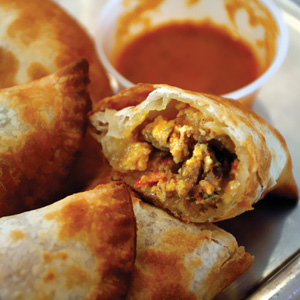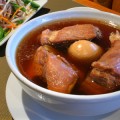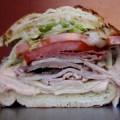One of the hallmarks of a thriving downtown is a variety of good restaurants at both ends of the price spectrum. A downtown also needs a number of options for people on the go;fast food that doesn’t taste like fast food for downtown denizens too busy to sit down for a proper meal.
Santa Clara Street is downtown San Jose’s main street. I set out on a walking tour and brought my appetite with me to see what I could find. I was looking for something more distinctive than Carl’s Jr. or Subway. They have outlets everywhere. I’m pleased to say I found plenty of good food perfect for eating on foot.
The Mmoon opened this fall on Santa Clara Street near North Almaden Avenue. The double m’s come from owners Mike and Marco Mendez’s initials. The brothers were born in Argentina and now live in Los Altos. The humming sound of the two letters is also the sound you make when you eat something good. And the Mmoon’s Argentine-inspired empanadas are good.
The bright interior of the restaurant looks a little antiseptic and corporate, but the delicious empanadas inject some soul into the place. The pastries are small but plump. One isn’t enough; you’ll want to order at least three. The thin, flaky pastry is superb. It ought to be, considering the lengths the Mendezes go to to get it. It’s flown in from Argentina. They reportedly tried to re-create the dough themselves but couldn’t get it right, so they went to the source.
Fillings include beef, chicken, vegetable and sausage. They even offer breakfast and dessert empanadas. I loved the chicken ($2.30) and the spinach ($1.90) empanadas. The chicken is made with dark meat, grilled artichoke hearts, sun-dried tomatoes and cheese. It was delicious and disappeared in two satisfying bites. The spinach combines greens, onion and cheese.
The empanadas come with a fantastic chimichurri sauce, a spicy-tangy red salsa that’s the perfect accompaniment. It’s made from a family recipe that reportedly goes back four generations. They should bottle the stuff.
Two blocks away from the Mmoon is Caffe La Pastaia, a phone-booth-size take-out restaurant run by the larger La Pastaia restaurant in the Hotel De Anza. Inside, there’s only space for one guy who slings out a steady lineup of pastas, soup, sandwiches and salads. The food is all served to go because there’s nowhere to sit.
The menu changes regularly. (Check out the day’s menu at http://www.lapastaia.com).
I went for a small sandwich of roast turkey, mozzarella, arugula and balsamic vinegar ($4.50). It was pre-made but tasted quite fresh. What made it stand out was the thick, wonderfully crusty, circular roll. The counterman deftly wrapped it up with waxed paper, and I was out the door happily munching my way to my next stop: Mexico Bakery No. 2.
Mexico Bakery is one of my favorite spots for tortas, a delicious, highly portable Mexican sandwich. Torta means “cake” in Spanish, but it’s nothing like a cake. Unlike virtually everything else served at cheap Mexican restaurants, the torta contains no tortilla, which, interestingly, means “little cake.” Perhaps the cake part refers to the bread upon which the torta is based. For me, the bread is the key to a great torta and the undoing of most.
A real torta, the kind served at little specialty shops on street corners throughout Mexico, is made with either a telera or bolillo roll. The latter is larger; both are firm like sourdough bread but soft and chewy inside. They both have sturdy crusts that hold up well to toasting and the multitude of ingredients contained between the two slices of bread. Too many Mexican restaurants skimp on the bread and serve crumbly, ineffectual rolls that fall between hamburger buns and steak rolls. Even if the fillings are first-rate, this kind of bread prevents a torta from achieving greatness.
As with Caffe La Pastaia’s sandwiches, what makes the torta stand out here is the fresh bread. The restaurant bakes its own sesame-topped rolls. Tortas are served on telera rolls unless you request a bolillo;and you may want to if you’re not really hungry. The regular version is quite large. Mexico Bakery features a number of torta options and also lets you mix and match. I liked the chorizo and ham torta ($4.50), a two-fisted sandwich loaded with avocado, pickled green jalapenos and onions. The vinegary bite of the jalapenos helps cut the richness of the sandwich.
Satisfied with my torta, I continued my perambulation down Santa Clara Street, only now I craved something sweet. That’s when I found Fruit Bites, a Mexican-style fruit cart. Fruit cocktail carts are common in Mexico and in better neighborhoods in San Jose. The vendor slices the fruit and vegetables of your choosing (generally a mix of mango, pineapple, oranges, strawberries, watermelon, apples, cucumber and jicama). What sets the cocktail apart at this cart is the salsa served over the fruit.
Fruit Bites’ owner Michael Guizar’s family also owns Mi Ranchito Taqueria on Alum Rock, and that’s where the salsa is made. Guizar says the recipe, like the one for the Mmoon’s chimichurri sauce, goes back several generations with his family in Michoacan. The sauce is made with dried chiles, vinegar and various spices. It’s watery but anything but bland. It’s spicy, a little tart and faintly salty. Poured over the sweet fruit, it’s delicious counterpoint. Guizar also sprinkles a little spiced salt on top.
If you don’t like your fruit spiced up, Guizar serves homemade yogurt, which is also made at his family’s restaurant. It’s somewhat thinner than store-bought yogurt. Add a little granola on top, and you’ve got a healthy snack to go.

 Carl Djerassi’s ‘Taboos’
Carl Djerassi’s ‘Taboos’ 


